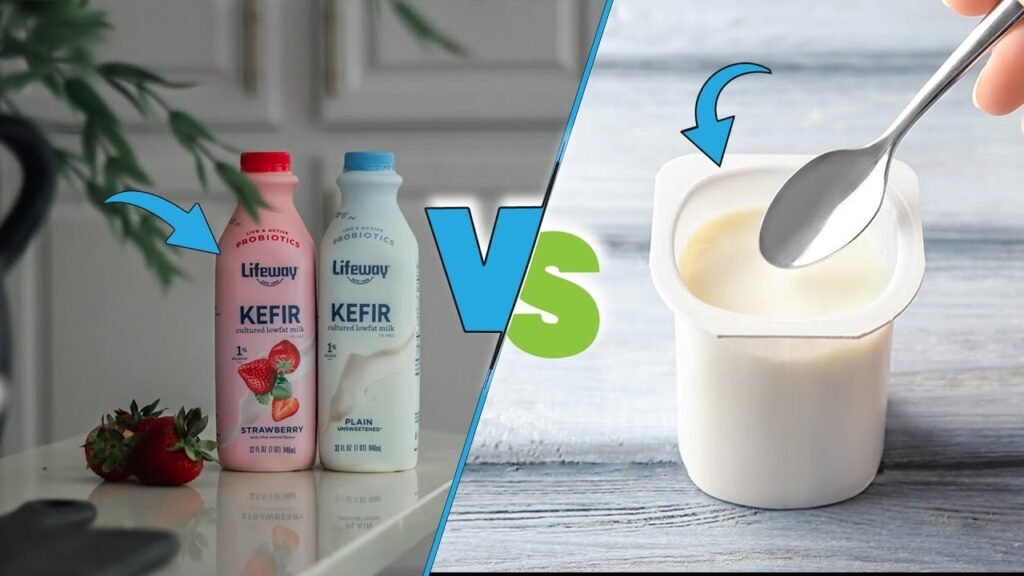
Kefir vs. Yogurt
Kefir and yogurt are two popular fermented dairy products, both known for their probiotic content and health benefits. While they share some similarities, they also have distinct differences that might make one more suitable for you than the other. In this article, we’ll compare kefir and yogurt in terms of nutrition, probiotic content, health benefits, lactose content, taste, and versatility to help you decide which one is better for your health.
Nutritional Comparison
Both kefir and yogurt are nutritious, but their exact nutrient content can vary depending on the type and brand.
Macronutrients in Kefir vs. Yogurt:
- Protein: Both kefir and yogurt are good sources of protein. However, Greek yogurt typically contains more protein than regular yogurt and kefir. For example, a serving of Greek yogurt can provide around 15-20 grams of protein, whereas kefir generally offers around 8-11 grams per serving.
- Fat: The fat content can vary widely depending on whether you choose whole milk, low-fat, or fat-free versions. Whole milk kefir and yogurt contain more fat than their low-fat or fat-free counterparts.
- Carbohydrates: Both products contain carbohydrates primarily from lactose, a natural sugar found in milk. The carb content is generally similar, though it can be slightly lower in Greek yogurt due to the straining process.
Vitamins and Minerals:
- Both kefir and yogurt are excellent sources of calcium, important for bone health. They also provide significant amounts of vitamin B12, riboflavin, and phosphorus. Kefir often contains higher levels of certain B vitamins due to the fermentation process.
Probiotic Content
One of the main reasons people consume kefir and yogurt is for their probiotic content.
Types of Probiotics:
- Kefir: Contains a broader variety of probiotic strains compared to yogurt. Kefir typically contains around 10-20 different types of beneficial bacteria and yeasts.
- Yogurt: Usually contains fewer strains, predominantly Lactobacillus bulgaricus and Streptococcus thermophilus, with some brands adding additional strains like Lactobacillus acidophilus and Bifidobacterium bifidum.
Benefits of Probiotics for Gut Health:
- Probiotics are beneficial bacteria that can help maintain a healthy balance in your gut microbiota, improve digestion, boost the immune system, and even enhance mental health by influencing the gut-brain axis.
Health Benefits of Kefir vs. Yogurt
Both kefir and yogurt offer several health benefits, largely due to their probiotic content and nutritional profile.
Digestive Health:
- Kefir: The diverse probiotic strains in kefir can help improve digestion and may be particularly beneficial for those with digestive issues like IBS (Irritable Bowel Syndrome).
- Yogurt: Also supports digestive health, but its benefits might be less pronounced due to the lower variety of probiotics.
Immune System Support Kefir vs. Yogurt:
- Probiotics in both kefir and yogurt can help boost the immune system by enhancing the body’s natural defenses against harmful bacteria and viruses.
Other Health Benefits:
- Kefir: Some studies suggest that kefir can help lower cholesterol levels, improve bone health due to its high calcium content, and may even have anti-cancer properties.
- Yogurt: Regular consumption of yogurt has been linked to lower blood pressure, improved metabolic health, and weight management.
Lactose Content and Digestibility in Kefir vs. Yogurt
Many people are concerned about lactose, especially if they are lactose intolerant.
Lactose Levels:
- Kefir: Generally contains less lactose than milk because the fermentation process breaks down much of the lactose into lactic acid. This makes kefir easier to digest for those with lactose intolerance.
- Yogurt: Also has reduced lactose content compared to milk, but the levels can vary. Greek yogurt, in particular, tends to have lower lactose levels due to the straining process.
Digestibility:
- Both kefir and yogurt are easier to digest than milk, but kefir might have the edge due to its broader range of probiotics and lower lactose content.
Taste and Texture
Your choice might also depend on taste and texture preferences.
Flavor Profiles:
- Kefir: Has a tangy, slightly sour taste, similar to buttermilk. It can also have a slight effervescence due to the fermentation process.
- Yogurt: Generally milder and creamier in flavor, though this can vary with the type (e.g., Greek yogurt is thicker and tangier).
Consistency Differences:
- Kefir: Thinner and more drinkable, often consumed as a beverage.
- Yogurt: Thicker and spoonable, making it more versatile for use in a variety of dishes.
Versatility in Cooking
Both kefir and yogurt can be used in numerous recipes, but they each have their strengths.
Recipe Ideas for Kefir:
- Smoothies: Blend kefir with fruits, vegetables, and a touch of honey for a nutritious smoothie.
- Salad Dressings: Use kefir as a base for creamy salad dressings.
- Baked Goods: Substitute kefir for buttermilk in pancakes, muffins, and cakes.
Recipe Ideas for Yogurt:
- Parfaits: Layer yogurt with granola, fruits, and nuts for a delicious breakfast or snack.
- Marinades: Use yogurt to tenderize and flavor meats.
- Dips: Mix yogurt with herbs and spices for a healthy dip for vegetables and chips.
Conclusion
Both kefir and yogurt offer impressive health benefits and can be valuable additions to your diet. Kefir might be the better choice if you’re looking for a broader range of probiotics and lower lactose content. On the other hand, yogurt, especially Greek yogurt, is excellent for its high protein content and creamy texture. Ultimately, the best choice depends on your individual health goals and taste preferences.
Have you tried kefir or yogurt? Which one do you prefer and why? Share your thoughts and favorite recipes in the comments below! Don’t forget to share this article with friends and family who might be interested in learning more about the health benefits of kefir and yogurt.
How to Make Kefir at Home: A Step-by-Step Guide
5 Health Benefits of Kefir: Why You Should Include It in Your Diet

